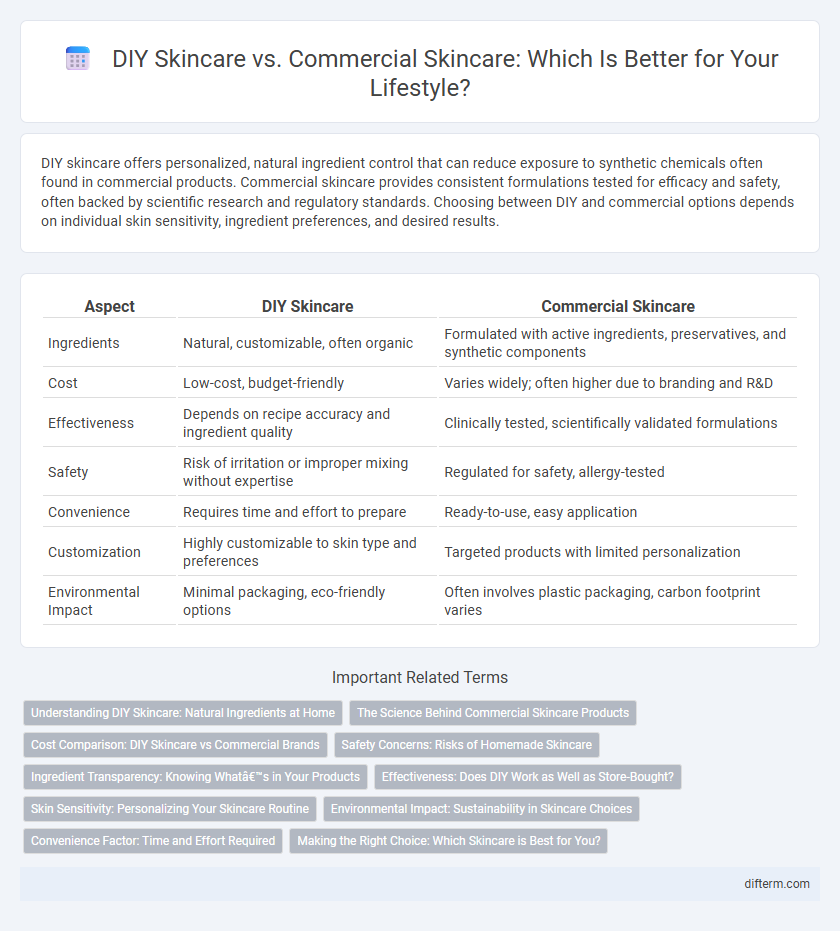DIY skincare offers personalized, natural ingredient control that can reduce exposure to synthetic chemicals often found in commercial products. Commercial skincare provides consistent formulations tested for efficacy and safety, often backed by scientific research and regulatory standards. Choosing between DIY and commercial options depends on individual skin sensitivity, ingredient preferences, and desired results.
Table of Comparison
| Aspect | DIY Skincare | Commercial Skincare |
|---|---|---|
| Ingredients | Natural, customizable, often organic | Formulated with active ingredients, preservatives, and synthetic components |
| Cost | Low-cost, budget-friendly | Varies widely; often higher due to branding and R&D |
| Effectiveness | Depends on recipe accuracy and ingredient quality | Clinically tested, scientifically validated formulations |
| Safety | Risk of irritation or improper mixing without expertise | Regulated for safety, allergy-tested |
| Convenience | Requires time and effort to prepare | Ready-to-use, easy application |
| Customization | Highly customizable to skin type and preferences | Targeted products with limited personalization |
| Environmental Impact | Minimal packaging, eco-friendly options | Often involves plastic packaging, carbon footprint varies |
Understanding DIY Skincare: Natural Ingredients at Home
DIY skincare utilizes natural ingredients such as honey, aloe vera, and oatmeal, which are rich in antioxidants and vitamins that nourish the skin deeply. Homemade recipes allow customization based on individual skin types, reducing exposure to synthetic chemicals and preservatives commonly found in commercial products. Understanding ingredient properties and sourcing organic components enhances effectiveness and minimizes adverse reactions in DIY skincare routines.
The Science Behind Commercial Skincare Products
Commercial skincare products leverage advanced scientific research to formulate ingredients that target specific skin concerns effectively, such as peptides for collagen stimulation and hyaluronic acid for hydration. These formulations undergo rigorous clinical testing to ensure safety, stability, and efficacy, often incorporating patented delivery systems that enhance ingredient absorption into the skin. The precision and consistency of commercial skincare products offer predictable results, contrasting with the variability found in many DIY skincare recipes.
Cost Comparison: DIY Skincare vs Commercial Brands
DIY skincare offers a cost-effective alternative to commercial skincare brands, often requiring minimal ingredients like oils, honey, and natural extracts that cost a fraction of branded product prices. Commercial skincare products can range from $20 to over $100 per item due to factors such as brand marketing, packaging, and proprietary formulas. Over time, DIY skincare routines can save consumers hundreds of dollars annually while providing customizable options tailored to specific skin types and needs.
Safety Concerns: Risks of Homemade Skincare
Homemade skincare products often lack preservatives, increasing the risk of bacterial contamination and skin infections. Inconsistent ingredient measurements can lead to irritation, allergic reactions, or chemical burns, especially with potent substances like essential oils. Commercial skincare formulations undergo rigorous testing and quality control to ensure safety, making them a more reliable choice for consumers concerned about product efficacy and skin health.
Ingredient Transparency: Knowing What’s in Your Products
DIY skincare offers complete ingredient transparency by allowing individuals to select natural, organic components tailored to their skin type, ensuring no harmful additives or preservatives are present. Commercial skincare products often contain complex ingredient lists with synthetic chemicals, fragrances, and preservatives, which can cause allergies or irritation, making it essential for consumers to scrutinize labels carefully. Understanding ingredient transparency empowers users to make informed decisions about product safety, efficacy, and suitability for their unique skincare needs.
Effectiveness: Does DIY Work as Well as Store-Bought?
DIY skincare offers the advantage of natural ingredients and customization but often lacks standardized formulation and stability found in commercial products. Scientific studies show commercial skincare typically provides more consistent results due to rigorous testing, controlled pH levels, and preservatives that enhance shelf life and efficacy. Effectiveness depends on ingredient quality and user consistency, with commercial skincare generally outperforming DIY remedies in delivering reliable and proven benefits.
Skin Sensitivity: Personalizing Your Skincare Routine
DIY skincare allows individuals with sensitive skin to control ingredient selection, minimizing irritants commonly found in commercial products like fragrances and preservatives. Commercial skincare offers clinically tested formulations with soothing agents such as niacinamide and ceramides, specifically designed to reduce redness and inflammation. Personalizing a skincare routine requires understanding skin sensitivity triggers and combining gentle DIY remedies with targeted commercial treatments for optimal results.
Environmental Impact: Sustainability in Skincare Choices
DIY skincare reduces environmental impact by minimizing packaging waste and using natural, biodegradable ingredients, which lower carbon footprints compared to commercial products often relying on synthetic chemicals and excessive plastic containers. Commercial skincare brands increasingly adopt sustainable practices like recyclable packaging and ethically sourced ingredients, but many still contribute significantly to pollution and resource depletion. Choosing skincare options with transparency in sourcing and eco-friendly formulations supports sustainability and fosters responsible consumption.
Convenience Factor: Time and Effort Required
DIY skincare offers personalized solutions but often demands significant time and effort for ingredient sourcing, preparation, and application. Commercial skincare products provide convenience through ready-to-use formulations, saving users valuable time in daily routines. This time efficiency makes commercial options preferable for busy lifestyles without compromising skin health benefits.
Making the Right Choice: Which Skincare is Best for You?
Choosing between DIY skincare and commercial products depends on your skin type, sensitivities, and ingredient preferences. DIY skincare allows for personalized formulations using natural ingredients like honey, aloe vera, and essential oils, ideal for those seeking chemical-free options. Commercial skincare offers scientifically tested formulas with active ingredients like retinol and hyaluronic acid, providing targeted treatments backed by dermatological research.
DIY Skincare vs Commercial Skincare Infographic

 difterm.com
difterm.com